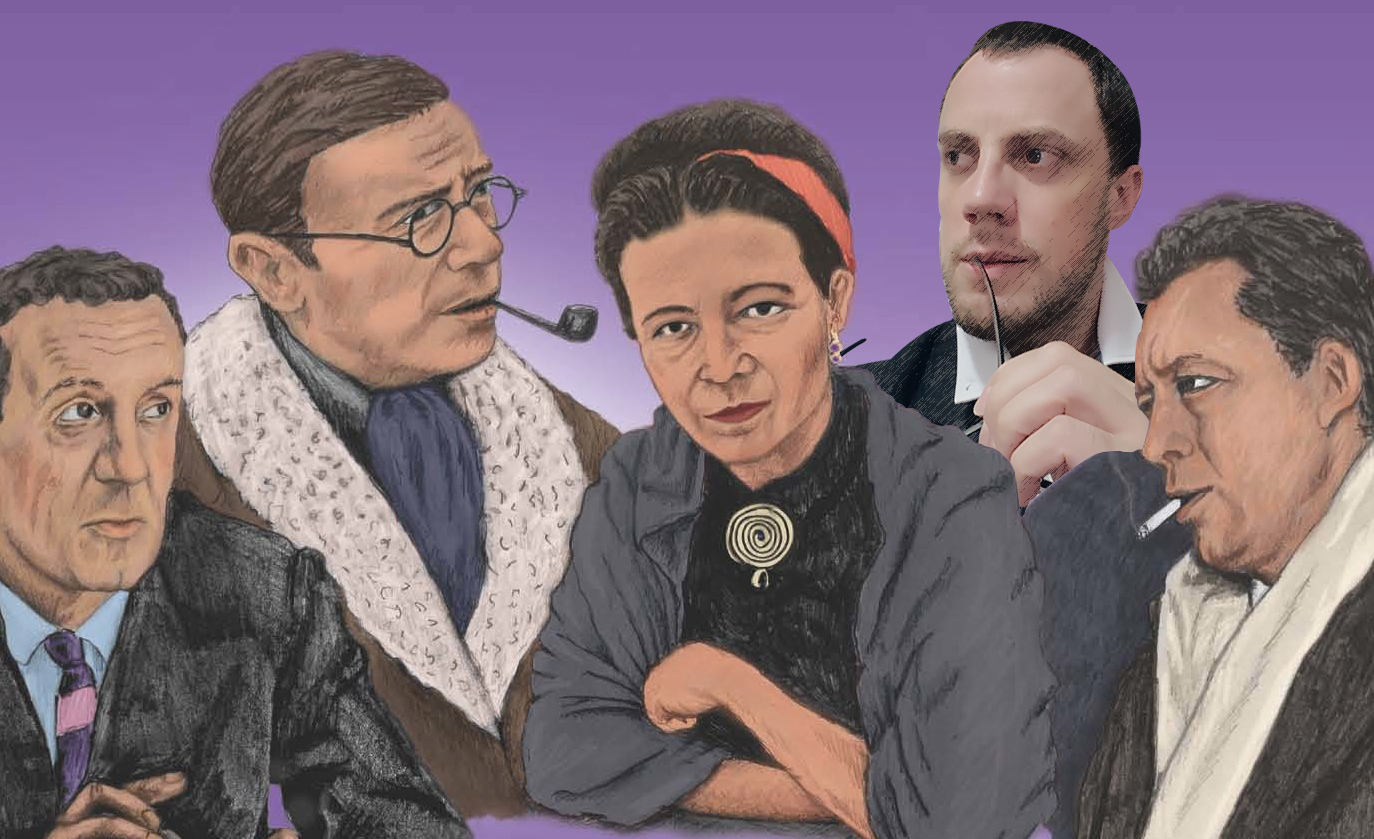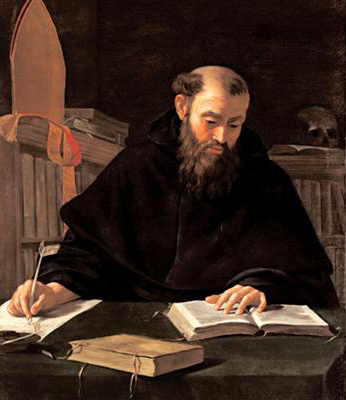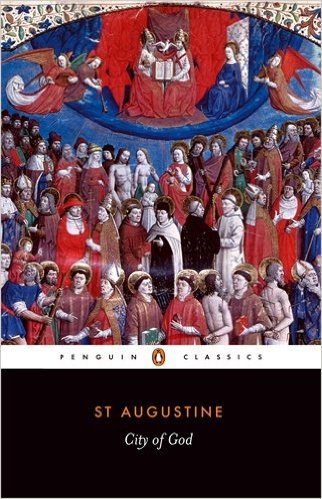The Philosophy
St. Augustine was a passionate fourth century Roman Christian who had a profound influence on the way Christianity developed, not only while he was alive, but also all through the Middle Ages.
He was a very intelligent individual and a deep thinker who made a number of penetrating insights that prefigure philosophers who appear centuries after his time. The thing with Augustine is that his penetrating philosophical insights always come in the context of an explicitly religious discussion with the sole goal of understanding God better. In one sense, this if fine; he was a Christian after all. But in my opinion, his allegiance to doctrine and superstitious mumbo-jumbo (angels, the devil, damnation, sin, creation, Adam and Eve, etc…) hamstrung him in such a way that he never got the chance to really flex his philosophical muscle. For example, Augustine anticipates Descartes’ famous insight, “I think therefore I am”, but never makes anything of it because it was nothing more than a side-effect of his discussion on the problem of evil. He also gives a very thoughtful account of time which ultimately goes nowhere because it was expounded merely to understand God’s eternal nature.
The truth is Augustine considered knowledge for knowledge’s sake a sin, so he more or less precluded himself from doing anything truly memorable as a philosopher. Although it’s true that any even partially comprehensive listing of great philosophers in history must include Augustine, he could have been a far more central figure than he ended up being (in philosophy, that is, he obviously had a huge impact on the Church and therefore Western history).
Augustine was quite prolific, composing a number of essays and books but this short review will be mostly based on the Confessions… primarily because I haven’t yet been able to muster up the courage to wade through the more than a thousand pages of his The City of God.
God
Augustine has a very standard, Christian view of God. In his Manichean days, he used to believe that God was some kind of extended substance simply because it seemed to him that anything that had no dimensions in space must itself be nothing. He seems to have overcome this through three steps. First, he notes a problem; if God is an extended substance in space then it means that the bigger a thing is, the more of God it contains. By this reasoning, an elephant contains more of God than a human. Something about this seems false to Augustine. Second, he realises that truth and thought are both real things although neither occupies a position in space. Third, he comes to understand that everything is in God, not like things in a physical container, but because all things get their being from God.
He also gives an argument for God’s incorruptibility that is almost identical in structure to the ontological argument for God’s existence (which wouldn’t be formulated for another 600 or so years). Nobody can conceive of anything better than God, and since being incorruptible is better than being corruptible, God must be incorruptible or else one could imagine something better than God.
God is eternal. Augustine contrasts this with being in time and accepts that this means God can’t change in any way. When God speaks, for example, this act can’t be understood as we would a human act of speech which takes place in time, with a beginning, an end, and so on. Rather, God’s Word exists for all of time because it is eternal. It would be more correct to say that God’s Word has no relation to time because it is completely outside of it.
While identifying this in the Confessions, Augustine doesn’t address how we can possibly have a relationship with such a timeless being though. His insistence on this also leads him into some controversial doctrines, such as predestination.
The Problem of Evil
The problem of evil is a perennial problem for Christians and asks how evil can exist if an all-good, all-powerful, all-knowing God also exists? First, Augustine rejects the response that says evil exists because we have freewill. He can’t understand how anybody could have the will to do wrong if he or she was created by an all-good God.
Augustine’s answer is that evil doesn’t, in fact, exist as a thing. All that exists is good. Augustine comes to this conclusion through an argument that doesn’t really hold up under scrutiny but goes something like this. To be incorruptible is better than being corruptible. To corrupt a thing means to remove good from it. All things corruptible must therefore contain some good to be removed. Now imagine a thing that has had all of the good removed from it so it is now nothing but evil. It can now lose no more good. But this means that it is now incorruptible. Since we already declared that incorruptibility is better than being corruptible, we now have a situation in which removing all of the good from a thing has made it better. This is clearly ridiculous and so Augustine’s solution is to propose that all that is, is good, i.e. if all of the good is removed from a thing, it then ceases to exist. Evil is not then a ‘real’ thing, rather it is a deprivation, a lack, of good.
Why then do we continue to perceive evil all around us? Augustine’s answer is that the evil we imagine we see is nothing more than disharmony among the individual parts of the whole; a whole which is harmonious in its totality. What is evil in one relation ceases to be so in another relation and the totality of all things is perfectly harmonious. One example Augustine gives is of clouds which we might consider bad, but when considered in relation to the earth, are actually beneficial.
In addition, Augustine offers the related idea that although some parts of creation are lower than others, i.e. less good, “the sum of all creation is better than the higher things alone.”
Creation
Augustine holds to the orthodox Christian belief that God created the universe ex nihilo, that is, from nothing. First, he created “formless matter” which he then bestowed form upon.
God created earth, the heavens, and the Heaven of Heavens. The first is self-explanatory; the second was the realm of the planets, moon, and stars; and the third was God’s “dwelling place”. Augustine has an interesting view of the Heaven of Heavens calling it an “intellectual creature”, clearly implying that it is somehow alive.
Having been created, Augustine holds that none of these realms are eternal (anything that changes cannot be eternal for Augustine and anything that was created is fundamentally changeable), but the Heaven of Heavens, while being susceptible to change, in fact doesn’t, because it clings to God unfailingly. It somehow keeps its gaze unflinchingly on God and therefore doesn’t change, essentially allowing it to partake in God’s eternal nature without itself being eternal.
Sin and Temptation
Augustine was obsessed with sin, even feeling the need to confess the ‘sins’ he committed as an infant against his parents and caregivers. He saw the material world as a never-ending trial, full of temptations ready to draw him into sin at every turn.
At one place in the Confessions he identifies three kinds of temptations (although this list wouldn’t be exhaustive). The first are sensory pleasures in which Augustine obviously includes lust (this was something Augustine had particular difficulties with) and alcohol, but he also includes things like enjoying pleasant smells and listening to pleasing music. The second is curiosity, which essentially amounts to science and learning. The third is the desire to be loved or feared by others.
Augustine’s problem with each of these is that they turn our attention from the only thing worthy of it, namely, God. He talks about listening to hymns and considers this to be sinful if one becomes seduced into enjoying the music solely for the auditory pleasure one obtains. The primary source of enjoyment should be the content. The extent to which one is enjoying listening, smelling, touching, tasting, or seeing anything just for the beauty of the things themselves, is the extent to which one is sinning.
His problem with science was the same. If it wasn’t related to understanding God better, it was a sin for Augustine. Knowledge for knowledge’s sake leads one away from God. He talks about the scientists who investigate the things we see around us and make amazing discoveries but who forget that the things they investigate should always lead back to the one who created them.
It is no exaggeration to say that the ideal life for Augustine is one spent in uninterrupted contemplation of God. It is no wonder he saw life as a trial, full of distractions.
Time
Augustine goes into a quite detailed analysis of time in relation to God’s eternal nature. God is eternal and unchanging, the material world is not; that much is certain. But what is time? In a way that prefigures Kant, Augustine concludes that time is completely subjective, that is, it is a mental construction. The past and the future cannot exist because the one is yet to come and the other has already been. A search for the present is just as futile, as we can whittle away any duration it might have; today, this hour, this minute, this second, this half-second, and so on. Eventually, we must get to a moment so short as to have no duration at all, i.e. no existence.
So, Augustine denies that there are three times, past, present, and future. But if they’re not real, how can we talk about them and how is it that we experience them? Augustine’s answer is that the future exists in our minds as expectation, the past as memory, and the present as awareness. In Augustine’s words, time is an extension of our minds.
Predestination
Augustine was uncompromising in his stance towards God’s eternal unchanging nature. Since God doesn’t exist in time he can’t change his mind or suddenly will something he didn’t before. What’s more, humans are fundamentally sinful in nature thanks to Adam’s gastronomical faux pax. As such, we are completely and thoroughly undeserving of salvation and there is nothing we can do to influence God’s mind about this. God, in his infinite Wisdom, which can’t change because it is eternal, must already know who is going to be saved and who is doomed to hellfire and all the good deeds in the world won’t change that. From the moment of your birth (actually, for all of eternity) you have already been destined to be one of the elect or one of the damned.
Allegorical Interpretation of the Bible
Augustine was an avid supporter of allegorical interpretations of the Old Testament and he used this technique to drill deep into the words and extract profound and sublime truths. This in turn, supported his belief that Scripture was itself profound and ought not to be taken at face value.
It is important to note though that, unlike modern interpreters of Scripture, Augustine did not use allegory to cleanse it of unpalatable and unlikely superstitions. Augustine would never have dreamed of ‘allegorising away’ things like the snake tempting Adam and Eve, original sin, God talking to Moses, Jesus’ death for our sins, and so on. As far as he was concerned, these events and all the other myths of Christianity were real events that really happened.



